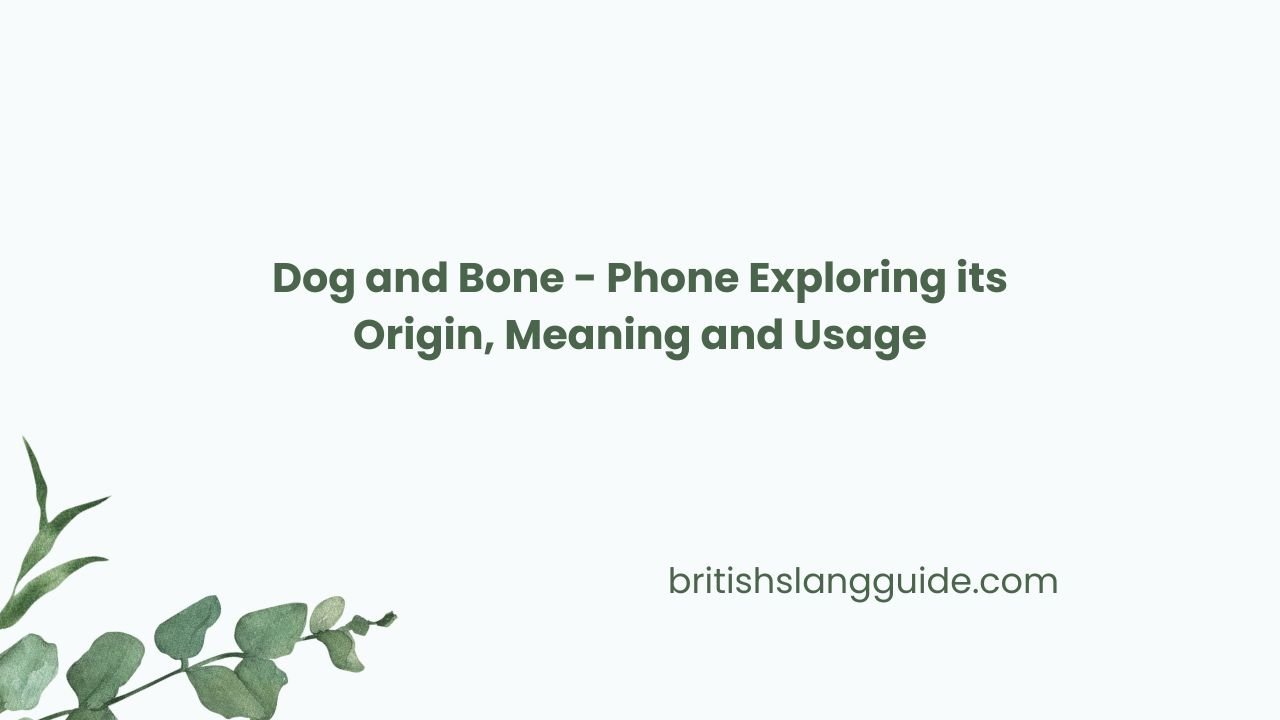| Please Wait Loading ..... |
 |

Countless varieties of different slangs are used daily in English but Cockney rhyming slang holds a special place. As we know a language is not just a way for conversation but also a reflection of history and cultural identity. This slang emerged from East London in the 19th century. The special form of language replaces simple words with silly rhyming phrases. Among all these, the most iconic example of cockney rhyming slang is “Dog and Bone” which refers to a “phone”.
In today’s discussion, we will take a deep dive into the full story of this slang, its origin, its meaning, and modern examples. We will also explore the influence of this slang in today’s pop culture.
“Dog and Bone” is a very classic example of rhyming slang which simply means phone. In our daily conversation, someone often says, “I have to get on for “Dog and Bone” calling mom”. The “Dog and Bone” is used for fun in this sentence. It often happens in cockney rhyming slang that people drop one phrase and only use the first part of the slang.
I am on the dog meaning I am on the phone. Only those who are familiar with this slang would understand the meaning of these.
To understand the history of this language, we must go into the streets of East London, where Cockney rhyming slang was born in the 19th century. Cockney is specially used for those people who were born within the earshot of bells in London near St Mary-le-Bow Church. These cockney rhyming slangs are openly used by the street sellers of London and also used as a secret code language by gangs and criminals for private communication, so outsiders do not understand their conversation easily.
This slang emerged in the early 90s when it became a popular device in businesses and homes. Because the phone rhymes with bone. The street in London adds a linking word dog to creative full rhyming slang.
Although these rhyming slangs are not in common use in our daily conversation as they were in the early 20th century. Some slang still holds its position and “Dog and Bone” is one of them.
It is used in many TV shows and British films, especially those that shoot in London. Comedians also use this slang to add humour and attract the attention of the audience. And basically, the context of this sentence helps the listener to understand the meaning of this slang. For example, “I’m chatting to my friend on the dog”. Moreover, “the dogs are ringing the whole day.” In this example, it refers to a phone.
Cockney rhyming slang is used in many movies, pop culture and dramas. They also hold a place in global pop culture. For example, the movies of Guy Ritchie like “Two Smoking Barrels” and “Lock, Stock”. In these movies, characters often use cockney rhyming slang, including this. EastEnders often includes this slang in their dialogues.
The famous band Madness, which is popular for songs about the working class of London life uses this slang in music. It is used for branding and advertising. In the UK, some phone shops use the phrase “Dog and bone” which shows a homey age to the cockney heritage.
Due to modernism and technology, these rhyming phrases may not be a part of today’s daily conversation, especially for the younger generation. But some slangs still survive through its nostalgic reference and regional dialects. “Dog and Bone” is one of them. Interestingly, there are new rhyming slang expressions which reflect today’s modern life, for example, “sausage roll” reference goal in football. “Barack Obama” referenced drama and many more.
This slang is more than just a cute cockney rhyming phrase; it's a window into the cultural heritage of cockney slang.
There are many reasons why Cockneys created this slang. Some of them are for humour and wit, cultural pride, secrecy, and identification of the working class of London. These slangs add colour and humor to everyday language. Like saying a dog and bone instead of wit and colour in the sentence.
In this time where emojis and abbreviations are used to add pleasure and fun in conversations, these slangs naturally add joy to language.
From the streets of East London to use in British Media, these slangs continue to hold their position even in today's modern world. Dog and Bone is not just a rhyming phrase, these are the rhyming words that add fun in languages. It doesn't matter if you are a language enthusiast, knowing the meaning of these phrases also helps you to improve your English.
It also connects you to the fascinating part of history. Adding these slangs in your daily conversations helps you to add color and joy to language.
Comments